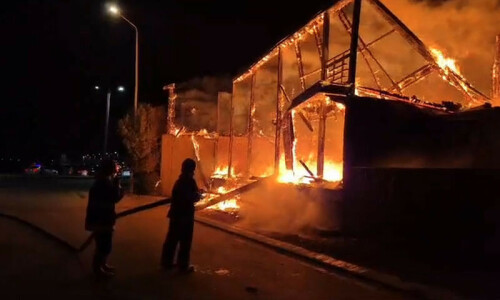
WASHINGTON: The United States expects its allies to go after Al Qaeda leaders if they are located within their territories and if they do not, the Americans will get them, says US Secretary of State Hillary Clinton. Also on Friday, the US media reported that the Obama administration had revived its covert drone campaign against Al Qaeda and the Taliban in Pakistan’s tribal areas after several months of slow activity.
In an interview to CBS News, Secretary Clinton said she agreed with US Defence Secretary Robert Gates that top Pakistani leaders were unaware of Osama bin Laden’s whereabouts.
“Would you recommend additional unilateral raids if you knew the whereabouts of other key Al Qaeda figures in Pakistan?” she was asked.
“I’m not going to comment on any hypotheticals and I certainly wouldn’t go into any operational details. But I think it should be sufficient to say that the United States has made it clear from the very moment we were attacked that we would go after those who had attacked us,” she said.
“Bin Laden was our primary target. The President made a gutsy decision. We were very pleased that the operation succeeded. And we’ve made it clear to people around the world that if we locate someone who has been part of the Al Qaeda leadership, then you get him or we will get him.”
What the US would do about its relationship with Pakistan if it determined that Pakistani leaders knew Bin Laden’s was in Abbottabad, she was asked. “I would answer the same way that Secretary Gates said, because he and I see this eye to eye. We believe that it was not proven that anybody at the top of the government in Pakistan knew where Bin Laden was,” Secretary Clinton responded.
“But it seems likely that somebody did know. I said that the first time I went to Pakistan. I said, ‘It’s hard to believe that somebody in your government somewhere — and it could be some very low-level person — doesn’t know where he is’. And we’re having very candid conversations with our Pakistani partners,” she said. Secretary Clinton, however, stressed that the US had had good cooperation with Pakistan on many important strategic interests and had supported Pakistan in the fight against the extremists who were killing and threatening their people.
“But we expect more. We’re having conversations about what more we can do together.”
Asked when she was planning to visit Pakistan, the secretary said: “We’ll see how the conversations go. Marc Grossman, my special representative to Afghanistan and Pakistan, is there now, following up on some of the areas of concern.”
The US State Department said earlier that Secretary Clinton planned to visit Pakistan after Ambassador Grossman returned from the region but the department’s spokesman also explained that the visit would only be finalised if the US envoy succeeded in laying the groundwork for further talks. Diplomatic sources in Washington say that Mr Grossman went to Islamabad with a road map for a future partnership, which includes conditions that the Americans believe should be acceptable to Pakistan.
Meanwhile, CNN quoted, Bill Roggio, a military affairs analyst and editor of the Long War Journal, as saying that the US had intensified its drone attacks on Fata and the increase was not due to intelligence gained from Bin Laden’s compound. “What has happened, since the Bin Laden raid, is that the US has not felt pressured to dial back the attacks due to Pakistani sensibilities,” he said. The United States has carried out six suspected drone strikes in Pakistan in the past 15 days, with an average of one strike every 2.5 days, CNN reported.
The US carried out 117 attacks inside Pakistan in 2010, more than double the number of strikes that occurred in 2009. By late August 2010, the US had exceeded 2009’s strike total of 53 with a strike in Kurram. In 2008, the US carried out a total of 36 strikes inside Pakistan.














































Dear visitor, the comments section is undergoing an overhaul and will return soon.